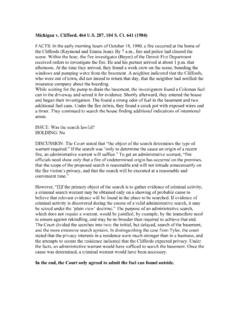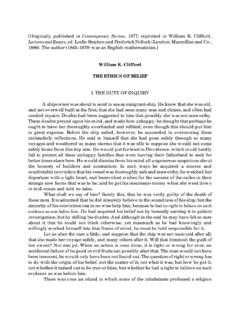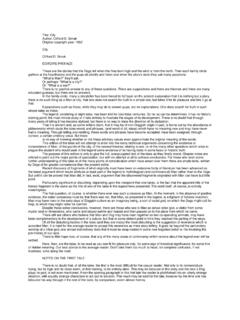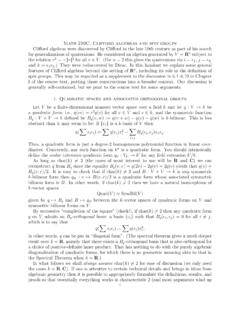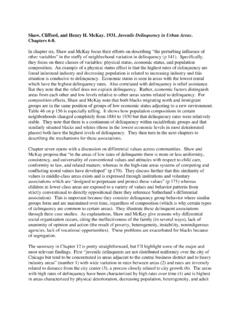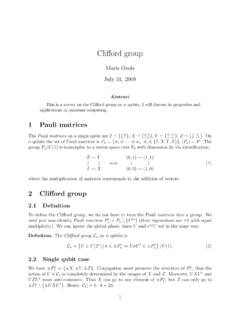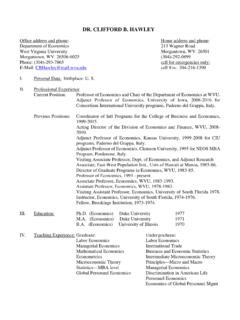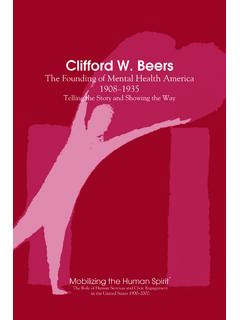Transcription of The Interpretation of Cultures: Selected Essays
1 The Interpretation of Cultures: Selected Essays clifford Geertz Basic Books, 1973 Chapter I / Thick Description: Toward an Interpretive Theory of Culture I In her book, Philosophy in a New Key, Susanne Langer remarks that certain ideas burst upon the intellectual landscape with a tremendous force. They resolve so many fundamental problems at once that they seem also to promise that they will resolve all fundamental problems, clarify all obscure issues. Everyone snaps them up as the open sesame of some new positive science, the conceptual center-point around which a comprehensive system of analysis can be built. The sudden vogue of such a grande id e, crowding out almost everything else for a while, is due, she says, "to the fact that all sensitive and active minds turn at once to exploiting it.
2 We try it in every connection, for every purpose, experiment with possible stretches of its strict meaning, with generalizations and derivatives." After we have become familiar with the new idea, however, after it has become part of our general stock of theoretical concepts, our expec- -3- ations are brought more into balance with its actual uses, and its excessive popularity is ended. A few zealots persist in the old key-to-the-universe view of it; but less driven thinkers settle down after a while to the problems the idea has really generated. They try to apply it and extend it where it applies and where it is capable of extension; and they desist where it does not apply or cannot be extended.
3 It becomes, if it was, in truth, a seminal idea in the first place, a permanent and enduring part of our intellectual armory. But it no longer has the grandiose, all-promising scope, the infinite versatility of apparent application, it once had. The second law of thermodynamics, or the principle of natural selection, or the notion of unconscious motivation, or the organization of the means of production does not explain everything, not even everything human, but it still explains something; and our attention shifts to isolating just what that something is, to disentangling ourselves from a lot of pseudoscience to which, in the first flush of its celebrity, it has also given rise.
4 Whether or not this is, in fact, the way all centrally important scientific concepts develop, I don't know. But certainly this pattern fits the concept of culture, around which the whole discipline of anthropology arose, and whose domination that discipline has been increasingly concerned to limit, specify, focus, and contain. It is to this cutting of the culture concept down to size, therefore actually insuring its continued importance rather than undermining it, that the Essays below are all, in their several ways and from their several directions, dedicated. They all argue, sometimes explicitly, more often merely through the particular analysis they develop, for a narrowed, specialized, and, so I imagine, theoretically more powerful concept of culture to replace E.
5 B. Tylor's famous "most complex whole," which, its originative power not denied, seems to me to have reached the point where it obscures a good deal more than it reveals. The conceptual morass into which the Tylorean kind of pot-au-feu theorizing about culture can lead, is evident in what is still one of the better general introductions to anthropology, Clyde Kluckhohn Mirror for Man. In some twenty-seven pages of his chapter on the concept, Kluckhohn managed to define culture in turn as: (1) "the total way of life of a people"; (2) "the social legacy the individual acquires from his group"; (3) "a way of thinking, feeling, and believing"; (4) "an abstraction from behavior"; (5) a theory on the part of the anthropologist about the way in which a group of people in fact behave; (6) a "store- -4- house of pooled learning"; (7) "a set of standardized orientations to recurrent problems"; (8) "learned behavior"; (9) a mechanism for the normative regulation of behavior.
6 (10) "a set of techniques for adjusting both to the external environment and to other men"; (11) "a precipitate of history"; and turning, perhaps in desperation, to similes, as a map, as a sieve, and as a matrix. In the face of this sort of theoretical diffusion, even a somewhat constricted and not entirely standard concept of culture, which is at least internally coherent and, more important, which has a definable argument to make is (as, to be fair, Kluckhohn himself keenly realized) an improvement. Eclecticism is self-defeating not because there is only one direction in which it is useful to move, but because there are so many: it is necessary to choose.
7 The concept of culture I espouse, and whose utility the Essays below attempt to demonstrate, is essentially a semiotic one. Believing, with Max Weber, that man is an animal suspended in webs of significance he himself has spun, I take culture to be those webs, and the analysis of it to be therefore not an experimental science in search of law but an interpretive one in search of meaning. It is explication I am after, construing social expressions on their surface enigmatical. But this pronouncement, a doctrine in a clause, demands itself some explication. II Operationalism as a methodological dogma never made much sense so far as the social sciences are concerned, and except for a few rather too well-swept corners--Skinnerian behaviorism, intelligence testing, and so on--it is largely dead now.
8 But it had, for all that, an important point to make, which, however we may feel about trying to define charisma or alienation in terms of operations, retains a certain force: if you want to understand what a science is, you should look in the first instance not at its theories or its findings, and certainly not at what its apologists say about it; you should look at what the practitioners of it do. In anthropology, or anyway social anthropology, what the practioners do is ethnography. And it is in understanding what ethnography is, or more exactly what doing ethnography is, that a start can be made to- -5- ward grasping what anthropological analysis amounts to as a form of knowledge.
9 This, it must immediately be said, is not a matter of methods. From one point of view, that of the textbook, doing ethnography is establishing rapport, selecting informants, transcribing texts, taking genealogies, mapping fields, keeping a diary, and so on. But it is not these things, techniques and received procedures, that define the enterprise. What defines it is the kind of intellectual effort it is: an elaborate venture in, to borrow a notion from Gilbert Ryle, "thick description." Ryle's discussion of "thick description" appears in two recent Essays of his (now reprinted in the second volume of his Collected Papers) addressed to the general question of what, as he puts it, "Le Penseur" is doing: "Thinking and Reflecting" and "The Thinking of Thoughts.
10 " Consider, he says, two boys rapidly contracting the eyelids of their right eyes. In one, this is an involuntary twitch; in the other, a conspiratorial signal to a friend. The two movements are, as movements, identical; from an I-am-a-camera, "phenomenalistic" observation of them alone, one could not tell which was twitch and which was wink, or indeed whether both or either was twitch or wink. Yet the difference, however unphotographable, between a twitch and a wink is vast; as anyone unfortunate enough to have had the first taken for the second knows. The winker is communicating, and indeed communicating in a quite precise and special way: (1) deliberately, (2) to someone in particular, (3) to impart a particular message, (4) according to a socially established code, and (5) without cognizance of the rest of the company.


